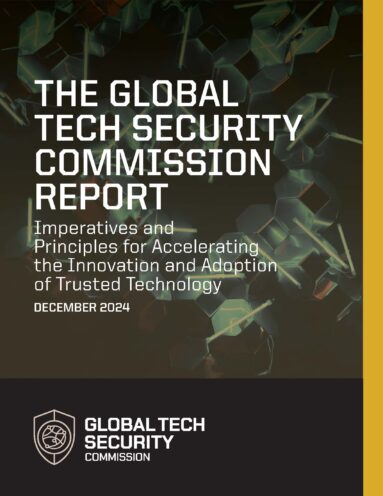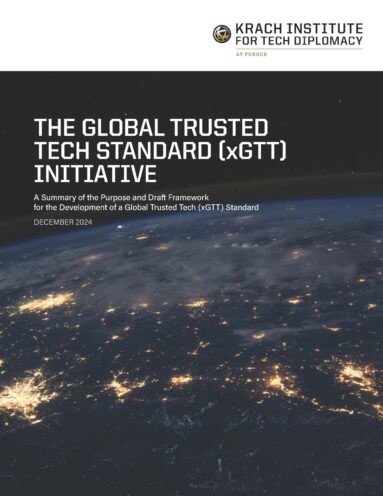The opportunity for free societies to flourish in a new era of technological innovation and enterprise is clear. The danger of a world where authoritarian regimes lead in technological superiority is also evident.
That is why the Global Tech Security Commission has engineered the Principles for Trusted Tech Diplomacy as the foundation for a practical, executable playbook for ensuring that technology advances freedom. We are offering a vision for how we must work together, beyond just what we must do.
The foundation of the Principles is the Trust Doctrine articulated in Section 1. We know that trust is the foundational element of all collective success. This is especially true in the digital world—interconnectivity means that a network’s security is only as strong as its weakest unit. The same applies to tech diplomacy.
These Principles of Trusted Tech Diplomacy are based on proven models for success in business and government.
They are designed to scale, enhance, and accelerate the coordination among private and public entities in every corner of the globe, and to serve as the foundation for trusted partners to develop offensive, defensive and force muliplier strategies to ensure technology advances freedom.
They are designed to leverage the free world’s biggest competitive advantages: the moral high ground of our values, the innovation and resources of our private sector, and our vast network of trusted alliances.
Principles of Trusted Tech Diplomacy
1. Uphold the Trusted Tech Doctrine
An ethical and responsible use of technology is paramount. We must uphold the values of the Trusted Tech Doctrine and innovate and implement technology in ways that advance freedom.
2. Empower Through Education
Knowledge is power. We must seize opportunities to promote understandings of trusted versus untrusted technology in what must be an all-of-free-world movement to secure high tech. It is imperative we take steps to align educational programs and curriculum with anticipated technological development and national security needs.
3. Lead with the Innovation and Creativity of the Private Sector
The tech race will not be won in Washington, D.C., Brussels, or at the UN. The private sector’s enormous influence, resources, creativity, and problem-solving power should drive technological advancements that advance freedom and security. Both private and public sector actors must collaborate on activities such as onshoring and nearshoring supply chains, advocating for technical standards that serve freedom and prosperity, growing domestic tech manufacturing bases, accelerating scientific research and development, training skilled workforces, and increasing entrepreneurial access to capital.
4. Rally and Unify Allies as Force Multipliers
There is strength in numbers and power in unity and solidarity. Marshalling the free world’s unmatched combined economic and technological power is the key to safeguarding freedom amidst a weaponized global tech competition. The free world has superior powers to innovate, outlay capital, set technological standards, merge strategies, and communicate trusted information to the world.
5. Build a Network of Networks
Increasing the number of nodes in the Global Trusted Tech Network exponentially expands the private and public entities and individuals committed to developing, deploying and adopting trusted technology that advances freedom. A network of networks bolsters the speed, scale and probability of success.
6. Create a Value Proposition for Partners
Untrusted technologies expose investors, countries and ordinary users to security, reputational, economic and financial risks. Actively demonstrate and always articulate the benefits of incorporating trusted technologies over untrusted technologies, rather than merely opposing untrusted alternatives. Prioritizing partnerships and transactions that show clear, shared gains will illustrate how trusted technology contributes to sustainable, mutually beneficial growth, security and prosperity.
7. Play to Win
The world is changing, and time is short to protect freedom. Old orthodoxies must be questioned, and in many cases, overturned. A priority must be placed on acting, operating and executing with the confidence and conviction to achieve our vision for a safe, free and prosperous future, rather than the fear of defeat by our adversaries. If the members of the Global Trusted Tech Network act boldly and in concert with one another, it will pave the way for the global triumph of trusted technologies.
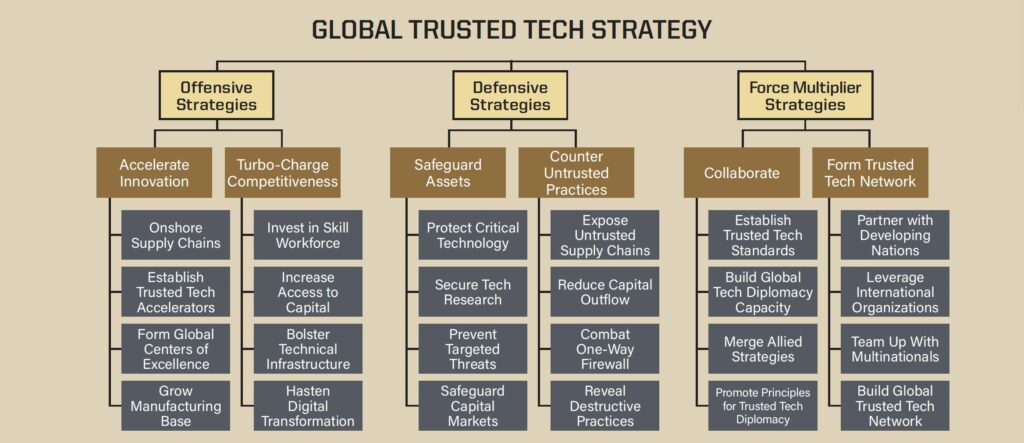
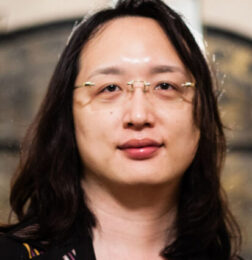
We are committed to working with all stakeholders, especially on open and collaborative R&D, democratization of AI, privacy, and cybersecurity standards. We look forward to engaging in inclusive co-creation that leads to digital resilience for all.
Audrey Tang
Global Tech Security Commissioner for Taiwan;
Cyber Ambassador-at-Large, Taiwan
Featured Content
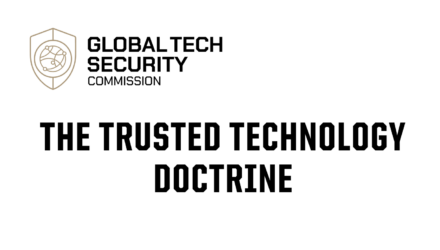
The Trust Doctrine embodies the belief in the primacy of trust as the foundation of peaceful relationships. Trust is firmly grounded in integrity, accountability, transparency, reciprocity and a profound respect for the fundamental pillars of free societies, such as the rule of law, human rights, property rights, fair labor practices, responsible environmental stewardship, freedom of expression, and national sovereignty.

The U.S. and its allies and partners must compete and win against our adversaries in critical and emerging technologies, and there is a fundamental difference between playing to win versus playing to not lose. At Purdue University’s “CHIPS for America: Execute for Global Success” Summit held at the U.S. Senate, Michelle Giuda, CEO of the Krach Institute for Tech Diplomacy at Purdue, outlines the new category of Tech Diplomacy and the requirements for winning a safe, free and prosperous future.

